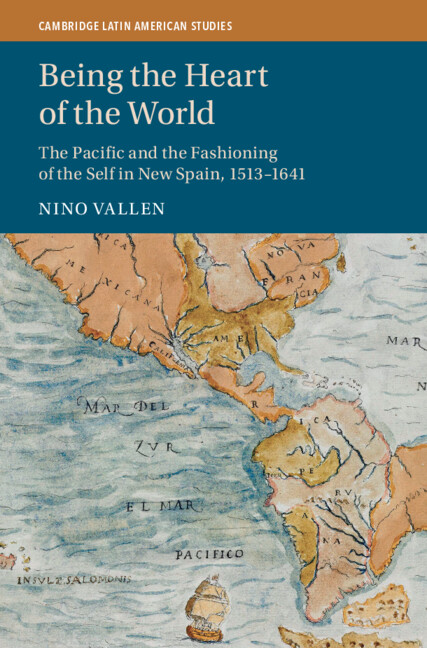
On October 8, 1565, a carrack commanded by the young captain Juan de Salcedo and piloted by the Augustinian friar Andrés de Urdaneta entered the port of Acapulco in New Spain. It was the first time that a Spanish ship successfully completed the long eastbound journey between the Asian and American continents. The discovery of this so-called tornaviaje and the new transpacific connections that developed during the following decades would have far-reaching consequences for the further development of Spain’s overseas empire. One effect that emerged in the immediate aftermath of these events concerned the changing perception of the place of New Spain and its inhabitants within the imperial order. For instance, in an account of the journey printed in Barcelona in 1566, the unknown author observed that “those of Mexico are mighty proud of their discovery, which gives them to believe that they will be the heart of the world.”1
When I first came across this quote many years ago, I was intrigued by this remarkable new vision of the Spanish empire. Originally, I found in the words of the anonymous author an affirmation of an idea stemming from the scholarship regarding the positive impact of the Spanish military, mercantile, and religious expansion in the Pacific on the self-consciousness of New Spain’s creole population. However, as I worked my way through archives in Mexico, Spain, and the United States, I realized that the narrative framework of an emerging creole identity insufficiently explained the intricate ways in which the Spanish activities in the Pacific influenced the formation of new notions of self and other in New Spain.
Being the Heart of the World: The Pacific and the Fashioning of the Self in New Spain, 1513–1641 presents an alternative framework for rethinking how the gradual integration of the Pacific into the Spanish empire shaped identity-making processes in the viceroyalty. In the book I examine these interactions through struggles over the distribution of royal privileges. I argue that explorers, conquerors and their descendants, royal officials, soldiers, clergymen, and merchants produced different stories about the Pacific while fashioning self-images that legitimized their claims to benefits or authority. At the same time, discussions about the establishment and desirability of transpacific connections also began to interact with more general debates over why some persons deserved certain benefits more than others. In these different distributive struggles, people fashioned their own notions of what I call a deserving self in relation to different visions of the Pacific or of Mexico’s figurative place in the world.
The deserving self that stands at the center of this approach was of great importance to the ways in which contemporaries understood who they were or, more importantly, what they could be. Intrinsically related to struggles over the distribution of resources, privileges, and honors, this specific regime of self was shaped to justify an individual’s contested claims about deserving certain benefits or authority more than others. Actors shaped such versions of the self, according to the setting or distributive struggle in which they found themselves, in relation to a diverse and idiosyncratic set of theories about human nature, social norms, and legal regimes, as well as distributive theories and practices and sentiments about the justness of both.
The book is structured such that each chapter focuses on a different struggle produced by the Spanish expansion in the Pacific between 1513 and the late 1630s, at which point political conflict interrupted transpacific interactions for several years. In each of these disputes a social character or category of merit is identified that linked notions of a deserving self or undeserving other to the Pacific. These categories are the discoverer, the veteran, the meritorious, the creole, and the merchant. I discuss on the one hand how people identified themselves with these markers while discussing new projects in the Pacific. On the other hand, I explore how inhabitants of the viceroyalty responded to military, religious, and trade activities in the Pacific and these activities’ effects on social hierarchies and claims of entitlement, revealing how celebrations of mobilities or resistance against them influenced different notions of a deserving self or undeserving other.
By examining how these disputes interacted with more general discussions about the distribution of New Spain’s limit resources and honors, Being the Heart of the World demonstrates the close ties between the history of the Spanish expansion in the Pacific and the development of the viceroyalty. Yet the book is more than just a history of colonial Mexico and the Spanish Pacific. Historians interested in early modern mobilities, subjectivities, and social disputes will find in it a case study that calls on us to understand that the history of this early phase of globalization should not be told as one of ever greater connectivity. Instead, it underscores that we have to pay attention, too, to the struggles over how mobility was valued in specific places and moments of time by actors who affected – sometimes only locally, on other occasions on a much larger scale – the dynamics of global integration and disintegration. At a time that senses of entitlement fuel opposition to globalization, the book thus offers useful historical reflections on the ways in which individuals and groups positioned themselves toward the mobilities and integrative processes connecting them to a wider world while struggling over the distribution of the benefits and opportunities these created.
[1] This account has been published in Emma Helen Blair and James Alexander Robertson, eds., The Philippine Islands, 1493–1803 (Cleveland, OH: A. H. Clark Co., 1903), 2: 230.

Being the Heart of the World by Nino Vallen
Latest Comments
Have your say!